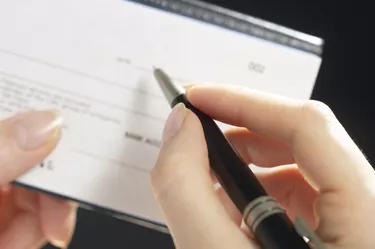
American consumers and businesses have access to a wide range of borrowing options, from credit cards and lines of credit to high-interest payday loans. Other countries have slightly different ranges of services, which occasionally can be of interest to Americans who spend much of their time overseas. One example is check discounting, a practice that's little-known domestically but widespread elsewhere.
The Basic Concept
Video of the Day
In the simplest form of check discounting, the financial institution allows you to take funds against a check without waiting for that check to clear. More sophisticated discounting scenarios use post-dated checks, creating the equivalent of a short-term loan for the amount and time frame of the check. The lending institution typically charges interest on the amount that's withdrawn, as well as a range of service fees that vary between institutions and countries.
Video of the Day
Why it's Useful
Although most Americans won't encounter this financial service, it can be useful to anyone who has an established business presence in a country where check discounting is offered. If you've struggled to obtain financing from American lenders for your overseas enterprise, you might find that local institutions -- with their intimate knowledge of the local economy -- are more obliging. Borrowing your working capital locally also reduces your exposure to fluctuations in the exchange rate between the U.S. dollar and local currencies, and helps establish your status as a player in the local business community.
How it Works
The terms and conditions associated with check discounting will vary between countries and lending institutions, but you'll see a number of common requirements designed to safeguard the lender. These typically include some combination of minimum sales volumes, a set number of years in operation and audited financial data. When the loan is approved, the lender advances 75 to 80 percent of the check's value, with the remainder -- less fees, commissions and interest -- paid out at the check's maturity. The same institutions also frequently offer bill discounting, providing similar borrowing privileges against your outstanding receivables.
A Few Points
As with any loan, it pays to do your homework. Interest rates, service charges, commissions and loan requirements can vary just as widely between foreign lenders as they do domestically, and performing the necessary due diligence is just as vital. That's especially important if you have a limited understanding of the local financial system and its regulatory environment. Draw on the expertise of your local staff, if possible, or network with other business people and financial professionals in the local market to assess the merits of potential lenders.